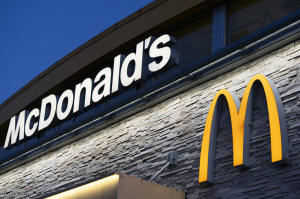US closes investigation into E. coli outbreak linked to onions in
McDonald's Quarter Pounders
 Send a link to a friend
Send a link to a friend
 [December 04, 2024]
By DEE-ANN DURBIN and JONEL ALECCIA [December 04, 2024]
By DEE-ANN DURBIN and JONEL ALECCIA
The U.S. government said Tuesday it has closed its investigation into an
E. coli outbreak tied to McDonald's Quarter Pounder hamburgers after
determining there is no longer a safety risk.
The outbreak, which was first reported Oct. 22, sickened at least 104
people in 14 states, including 34 who were hospitalized, according to
the U.S. Food and Drug Administration. One person in Colorado died and
four people developed a potentially life-threatening kidney disease
complication.
The FDA, which conducted the investigation along with the U.S. Centers
for Disease Control and Prevention and state health departments, linked
the outbreak to yellow onions distributed by California-based Taylor
Farms and served raw on Quarter Pounders at McDonald’s restaurants in
Colorado, Kansas, Wyoming and other states.
There have been no new cases reported since Oct. 21, when McDonald's
pulled the Quarter Pounder off its menu in the affected states, the CDC
said Tuesday. Taylor Farms initiated a voluntary recall of yellow onions
on Oct. 22.
Federal and state health officials in Colorado didn’t find the strain of
E. coli that caused the illnesses in onions it tested or in any samples
from the environment. But they concluded that evidence showed that
recalled yellow onions were the likely source of the outbreak.

“McDonald’s is no longer serving recalled onions and there does not
appear to be a continued food safety concern related to this outbreak,”
the FDA said Tuesday in a statement.
McDonald's briefly pulled Quarter Pounders from 3,000 U.S. stores as a
result of the outbreak, then narrowed that to 900 stores once testing
had pinpointed onions — and not hamburger patties — as the likely source
of E. coli. The company found an alternate supplier and resumed selling
Quarter Pounders with slivered onions at all U.S. stores last month.
But the outbreak has hurt demand. In mid-November, McDonald's said it
planned to spend $100 million to bring customers back to stores,
including $65 million that will go directly to the hardest-hit
franchisees.
[to top of second column]
|

A sign at a McDonald's restaurant is displayed on April 29, 2024, in
Albany, Ore. (AP Photo/Jenny Kane, File)
 Chicago-based McDonald's wouldn't
say Tuesday whether its sales have returned to normal levels in the
affected regions. But it thanked U.S. regulators for their quick
action and said it remains confident in its rigorous food-safety
standards.
McDonald's last major food-safety issue happened in 2018, when more
than 500 people contracted an intestinal illness after eating its
salads.
McDonald's also declined to comment Tuesday on legal action against
the company as a result of the E. coli outbreak.
Nicole and Richard West of Townsend, Montana, are suing McDonald’s
after their 11-month-old daughter, Logan, was hospitalized in
October with E. coli poisoning. The toddler ate a few bites of her
father’s Quarter Pounder hamburger with onions during a family road
trip on Oct. 2.
She fell ill a few days later with severe vomiting and diarrhea. Her
mother rushed her to the hospital, where she was found to be
infected with E. coli O157:H7, which can cause life-threatening
illness, particularly in young children.
Richard West also fell ill but didn’t seek medical attention because
he was at home caring for the family’s other children. He lost more
than two weeks of work as a truck driver because of the outbreak and
the family faces a barrage of medical expenses.
Nicole West said Tuesday that Logan's health has improved but the
outbreak has shaken the family’s confidence in the fast-food giant.
“With kids, when you want to go out to eat, they want to go to
McDonald’s. They want to get a Happy Meal,” West said. “But we just
don’t trust it anymore.”
All contents © copyright 2024 Associated Press. All rights reserved |